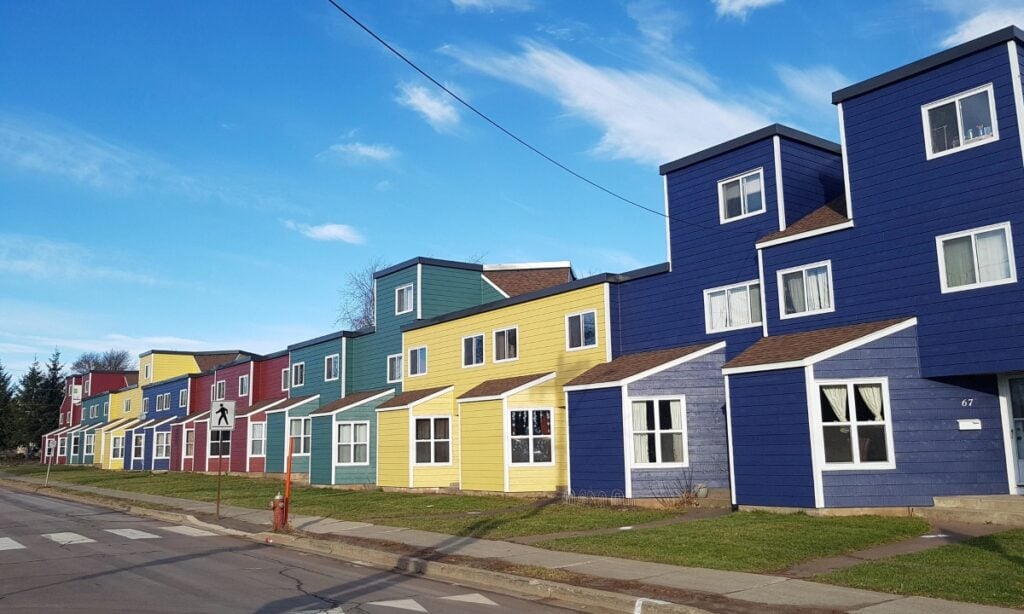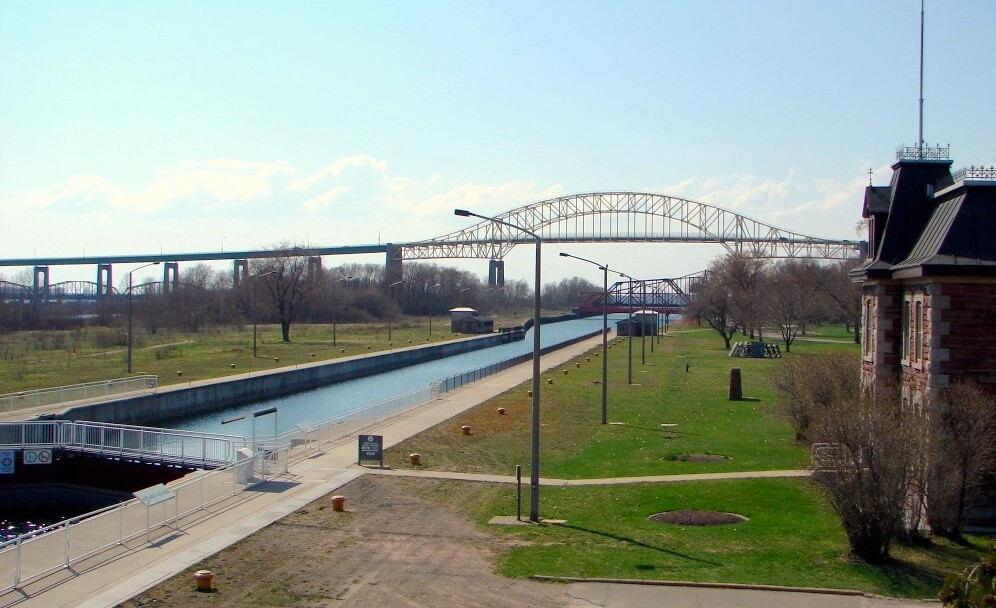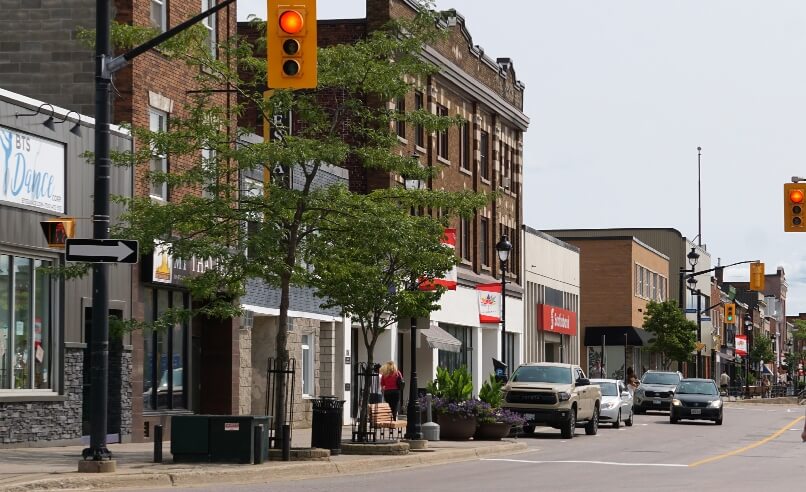Where to Buy Real Estate in Canada 2023: National ranking
Following a year of dramatic ups and downs, the Canadian real estate market is stabilizing. Our data reveals the regions and neighbourhoods offering the most value to home buyers in 2023.
Advertisement
Following a year of dramatic ups and downs, the Canadian real estate market is stabilizing. Our data reveals the regions and neighbourhoods offering the most value to home buyers in 2023.
Following two years of skyrocketing price gains, the Canadian real estate market came back down to Earth in 2022. The year started off with record-high prices in the winter, which is typically one of the slowest seasons in real estate. Throughout spring and summer, prices declined steadily.
The story of the year was inflation and interest rates; real estate prices across Canada have been, and still are, heavily impacted by higher mortgage rates and shrinking buying power. According to the Canadian Real Estate Association (CREA), in January 2022, the national composite benchmark price across all home types was $817,000, and by December, it had fallen by $100,000 to $717,000.
Although last year proved to be turbulent for real estate and the wider economy, many markets still experienced price growth. And some regions and neighbourhoods stand out as offering the greatest value and growth potential.
For our 2023 edition of Where to Buy Real Estate in Canada, MoneySense partnered with Zoocasa—an award-winning consumer real estate search platform—to reveal the best places to buy property in Canada and in 13 of the country’s most-watched real estate markets, from Halifax to Vancouver.
In the table below, you’ll find the top places to buy real estate in Canada, based on Zoocasa’s analysis of data from 45 different regions. Slide the columns right or left using your fingers or mouse. You can download the data to your device in Excel, CSV and PDF formats.
Source: Zoocasa
Real estate demand fizzled last year, primarily because of rising interest rates, low inventory and reduced buyer appetite. According to CREA, monthly sales activity in December came in 39% below that of December 2021. Even with declining prices, properties became progressively less affordable as interest rates increased a staggering seven times in nine months. On a national level, the average sale price declined by 12% year-over-year in December, according to CREA, but that wasn’t enough to make buying a home more appealing for Canadians.
“Buyers took to the sidelines and many chose to wait out the market, hoping for a positive change that would make real estate in Canada more affordable,” says Lauren Haw, broker of record and industry relations officer at Zoocasa. “Motivated buyers shifted their strategies, favouring more affordable property types including condominium apartments and townhouses. Although many buyers returned to city centres following the pandemic, some continued to look to smaller, more affordable markets in 2022 to make their money go further.”
Fixed interest rates began to decline in January 2023, leading to a more positive start to this year. The sideline buyers of 2022 have become interested in the market again. According to a 2022 Zoocasa survey, around 60% of respondents, including current home owners and first-time home buyers in Canada, are still planning to buy a home in the near future. “The 2023 market is dependent on affordability. If interest rates decline, buyer sentiment should shift in a more positive direction,” says Haw.
Compared to 2021, home price growth in 2022 was far lower across the board for the markets included in our study. The majority of price gains occurred in the first quarter of 2022. Because prices declined consistently in many major markets for the remainder of the year, many cities ended 2022 with weak year-over-year price increases. However, some smaller markets—including Calgary and Greater Moncton—experienced price gains even in the final months of the year. Demand in the regions that neighbour major markets, like Kitchener-Waterloo, Hamilton and the Calgary suburbs, continues to grow.
Across the country, the housing supply is still tight, and it may remain so. The Government of Canada recently announced a record immigration target of 1.5 million new Canadians by 2025, which will drive new demand for housing, especially in city cores. This will likely have a ripple effect, driving up prices in markets that are experiencing short supply.
The most populous region in New Brunswick topped our list for the second year in a row, with a value score of 4.8. Despite substantial growth in the average price, homes in the Moncton region continue to be affordable compared to the national average. Consisting of Moncton, Riverview and Dieppe, Greater Moncton boasts inexpensive real estate opportunities for first-time buyers, and its steady price growth presents an opportunity for sellers and investors.

At 60% below the national average, Greater Moncton’s composite benchmark price of $320,817 makes the region an excellent destination for those new to home ownership.
“More young buyers are searching for their first home because rental prices have increased rapidly alongside demand,” shares local eXp agent Jenny Celly. (Zoocasa, the author of this study, is wholly owned by eXp World Holdings.) “Homes in the $300,000 range are currently really sought-after, especially by first-time home buyers, which has put those types of units in short supply.”
The area’s home prices have seen significant gains, with the benchmark price rising 26% over one year, 84% over three years, and an impressive 102% over five years. But the interest rate hikes of 2022 led to a more balanced market in Greater Moncton. If the Bank of Canada continues to hold rates steady, as it has so far this spring, the region may see increased buyer demand.
Compared to home prices in other regions of Canada, those in Greater Moncton haven’t cooled off as much and have remained fairly steady. The benchmark price peaked in May 2022 at $340,900, and by December 2022 had dipped 10% to $303,600. However, prices are inching upwards, with February 2023 seeing a benchmark price of $305,200.
“Many cities in New Brunswick are much more affordable than other major markets. The high levels of immigration, as well as the interest from buyers in other provinces that have been priced out of their market, are supporting our home prices,” explains Celly.
With affordable housing, plentiful job opportunities and an abundance of nature, this Maritime region will likely keep drawing in prospective buyers.
Idyllically situated in the heart of the Great Lakes, Sault Ste. Marie is full of Northern Ontario’s most charming rivers, lakes and outdoor spaces. Achieving a value score of 4.7, “The Soo” offers low prices and a welcoming community to prospective home owners. Its population is just over 78,000.

Sault Ste. Marie’s real estate market drove forward in 2022, attracting out-of-town buyers who helped its benchmark price enter the $300,000 range for the first time. The summer market was especially busy; the benchmark price peaked at $320,700 in May 2022 and remained above $300,000 for three more months. The last quarter of 2022 saw a slight dip, and the benchmark price finished the year at $275,400.
“There were two categories of buyers that were really hot in 2022: those looking for a detached, single-family home, and investors looking for multi-family units,” explains local eXp agent Jean Morrison. “In terms of family homes, the detached three-bedroom bungalow was in high demand. For multi-family homes, duplexes, triplexes and anything that offered passive income moved quickly.”
But it wasn’t only potential home owners looking towards Sault Ste. Marie, adds Morrison. “Rental properties are in high demand, and investors can purchase something at a comparatively low price and really reap the rewards.”
Few regions can compete with Sault Ste. Marie on average home price—at $292,208, it was $500,650 below the national average at the end of 2022. The average home price in the area grew 26% over one year, 75% over three years and 84% over five years.
“Towards the end of last year, sellers were willing to list in the off-season because inventory was so low,” says Morrison. “Listings were selling for good prices and were still receiving multiple offers. Properties were moving quickly even though interest rates went up.”
Spring fever is already kicking off. That combined with Sault Ste. Marie’s affordable prices put this area in a good position for growth in 2023.
North Bay is one of the top three best places to buy real estate for the second year in a row, thanks to a value score of 4.2. Located on Lake Nipissing in northeastern Ontario, North Bay is just 125 kilometres from Sudbury. It also offers many of Canada’s best natural features, including many parks, trails and conservation areas.

North Bay finished 2022 with a composite benchmark price of $413,525—47% below the national average—making it one of the most affordable cities to buy real estate in Canada. That’s despite significant price appreciation in recent years: 21% in just one year, 83% in three years and a whopping 90% in five years.
This is great news for existing property owners and investors in the city, as well as prospective buyers who are looking for an affordable, entry-level market. Buyers can also choose from a variety of property types, including condos, Victorian homes and modern, single-family homes.
“This sometimes-overlooked market has experienced impressive double-digit price growth on a one-year, three-year and five-year basis,” explains Zoocasa’s Lauren Haw. “There are few comparable markets in Northern Canada that offer prospective buyers such reasonably priced homes that are appreciating so quickly.”
North Bay is the perfect city to call home in 2023, if you like spending time outdoors year-round and enjoy a small-town lifestyle with nearby amenities. In 2022, home prices remained in the $400,000 range for the first seven months. The average price peaked at $475,600 in April; however, by December, it had declined by 23% to $364,700. Rising interest rates have affected most Canadian markets, and North Bay has not been immune.
In January 2023, the benchmark price began ticking upward again, reaching $372,800. “Like many other smaller markets in Ontario, prices declined at a slower rate in North Bay and have already experienced a slight increase in 2023 as prospective buyers and sellers prepare for the spring market,” says Haw.
While it’s hard to predict if North Bay will continue to see double-digit growth year-over-year, this market is a great opportunity for those looking for economical prices.
To determine the regions and neighbourhoods that offer home buyers the greatest value in 2023, Zoocasa studied real estate data from the top real estate markets across Canada. Rankings are based on data collected at the end of March 2023, and interviews were conducted in February and March.
The home price data for the national ranking was pulled from CREA. We determined which areas to include based on what information was available from CREA. CREA does not provide data for all Canadian cities and markets, meaning some areas may not be covered in our report. The data for certain cities, such as Hamilton and Burlington, is reported together by CREA and reflects the benchmark price of the two cities combined.
We ranked regions and neighbourhoods within the same geographic area against each other. The overall rankings and scores are based on the areas’ benchmark home prices and recent real estate price growth.
Our value score accounts for an area’s composite benchmark home price as of Dec. 31, 2022, relative to the overall regional average, with more affordable home prices contributing positively to the score. The calculation also accounts for one-year, three-year and five-year home value growth in the area, with more weight assigned to the most recent data. Although recent comparables are better indicators of value, a positive and steady trend of home value growth was considered as part of the overall calculation.
In addition to home price data and value scores, our neighbourhood rankings also factor in neighbourhood economics data, which we weighted equally with value in the overall evaluation. These neighbourhood economics scores are based on factors commonly considered in economic and affordability indexes: the percentages of households that own or rent, education levels, median income and household income.
To gain further insight into each neighbourhood, we have included additional information on amenities, accessibility and the percentage of households with children. While we did not use these factors to determine the overall ranking, they helped us assess the lifestyle in each area.
The neighbourhood accessibility scores comprise a walk score, transit score and bike score. Each factor is given a score out of 100; the three scores are weighted at 60%, 30% and 10%, respectively, for a neighbourhood accessibility score out of 5.
We used data from the following organizations: Statistics Canada, CREA, Nova Scotia Association of Realtors (NSAR), Toronto Regional Real Estate Board (TRREB), Realtors Association of Edmonton (RAE), Calgary Real Estate Board (CREB), Real Estate Board of Greater Vancouver (REBGV) and WalkScore.
Affiliate (monetized) links can sometimes result in a payment to MoneySense (owned by Ratehub Inc.), which helps our website stay free to our users. If a link has an asterisk (*) or is labelled as “Featured,” it is an affiliate link. If a link is labelled as “Sponsored,” it is a paid placement, which may or may not have an affiliate link. Our editorial content will never be influenced by these links. We are committed to looking at all available products in the market. Where a product ranks in our article, and whether or not it’s included in the first place, is never driven by compensation. For more details, read our MoneySense Monetization policy.
This content package is presented by an advertising partner. It was independently produced by MoneySense in collaboration with Zoocasa and is presented with financial support from Ratehub.ca.
Share this article Share on Facebook Share on Twitter Share on Linkedin Share on Reddit Share on Email
You are delusional if you think Moncton is the best place to invest.
Websites and lists like these are the only reason prices bloated the way they have. Years ago I saw the Property Brothers pushing to invest here and thought “oh no, now the prices are going to go insane.”
Moncton is lovely, but healthcare is a completely broken mess with people waiting 7 years for a doctor (they say no one has been on the waitlist that long, but that’s because they keep deleting people off the list). Good luck getting a decent job if French isn’t your first language. In 2019 it passed PEI as the poorest province in the country. Internet access in many places is incredibly shoddy (often running at a tiny fraction of advertised speeds or the ‘national minimum speeds’). Homelessness is soaring because low wage workers have no hope of affording housing. There is very little actually produced here aside from lumber and blueberries. Most people from here know, if you want to be successful, leave.
This tiny city has skyrocketed beyond any reasonable prices because people in big cities keep hearing it’s a good investment. It’s a bubble that’s doomed to pop. You don’t invest in a bloated stock, that’s the time to sell. Moncton is the Enron of real estate.
That’s what I thought. Thanks for mentioning the obvious.